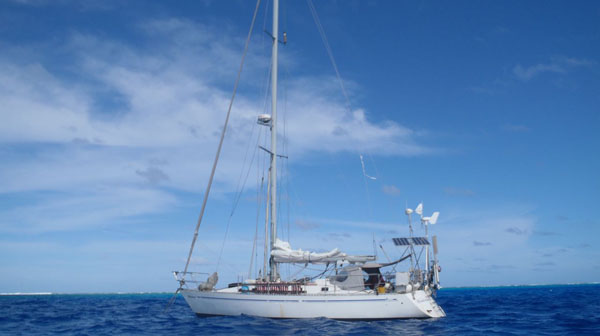How to Land a Crewing Job at Sea
Kelly Wetherington has been traveling “by the seat of her skirt” since she first escaped her cubicle in 2007. Her insatiable curiosity for the world and thirst for adventure have led her to trek, dive, sail, zip, surf, climb, and paddle her way through 25 countries across Central America, Europe, Southeast Asia, and the Pacific. On Monday, she shared the story of landing her first crewing job. Today, she explains how to find a crewing job at sea.
What to do to increase your chances of becoming crew
Learn as much as you can before you seek a position.
Go sailing, practice tying knots, familiarize yourself with yachtie terms.
Learning to sail is like learning to speak a foreign language. If you aren’t willing to ask the dumb questions like “What does to reef mean?” then you will never learn the lingo (reefing is taking in a sail).
— Hot bunking – what happens when there is more crew than beds. Rotating beds between watches.
— Sheet – ropes
— Starboard – right side of the boat
— Port – left side of boat
— Tack – change direction in reference to wind
— Bow – front of yacht
— Stern – back of yacht
What you can expect to learn aboard
— How to stay on course
— Steering
— Navigation
— How to tie many different knots
— Trimming Sails
— Jibbing
— How to scale and clean a fish
— How to get along well with others in very small spaces
Common crewing tasks
— Cooking
— Day/Night watches
— Assisting with adjusting sails
— Cleaning
— Boat Maintenance
— Fishing
— How to anchor
— Provisioning (grocery shopping, stocking up for months at a time)

What to bring with you
— Waterproof jacket and pants
— Fleece
— Crocs (I swore I never would, but they are useful and you should dress the part)
— Seasickness medication
— Sunscreen
— Hat
— Books
— Books on tape (for night watches)
— Headlamp with red light so you don’t wake others during the night
— Tolerance and an open mind
What to expect while at sea
— Hard work
— Adventures
— Beautiful sunsets
— Yachtie lifestyle is not as glamorous as you might think
— Be prepared to go for days/weeks without a shower
— Zero privacy
— BIG swells
— Seasickness
— Boredom
Crewing Seasons Around the World
South Pacific: May-October
Caribbean – year round, but busiest season is October – March
Mediterranean – May – September
North Europe – June-September
How to choose the boat that is right for you
**It doesn’t matter the size or condition of a boat, the only thing that matters is that you like the other people on board.
If you do not get along well with someone on land, chances are you are going to have a lot of troubles at sea! Being tolerant of differences is key to surviving in a small confined space with diverse personalities and opinions.
**A seemingly normal person on land can transform into a totally different person at sea. It is the risk you take in the name of adventure!
Happy sails to you!






